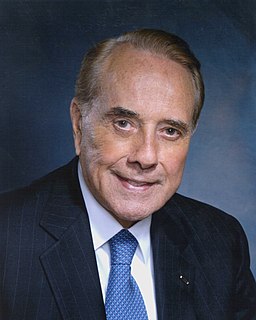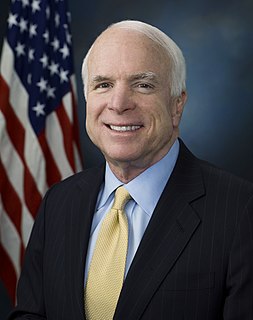
The 1988 United States presidential election was the 51st quadrennial United States presidential election. It was held on Tuesday, November 8, 1988. Incumbent Vice President George H. W. Bush, the Republican nominee, defeated Democratic Governor Michael Dukakis of Massachusetts. The 1988 election is the only election since 1948 in which either major party won a third straight presidential election.

Lloyd Millard Bentsen Jr. was an American politician who was a four-term United States Senator (1971–1993) from Texas and the Democratic Party nominee for vice president in 1988 on the Michael Dukakis ticket. He also served as the 69th United States Secretary of the Treasury under President Bill Clinton.
The 1988 National Convention of the U.S. Democratic Party was held at The Omni in Atlanta, Georgia, from July 18–July 21, 1988, to select candidates for the 1988 presidential election. At the convention Governor Michael Dukakis of Massachusetts was nominated for President and Senator Lloyd Bentsen of Texas for Vice President. The chair of the convention was Speaker of the U.S. House of Representatives Jim Wright.
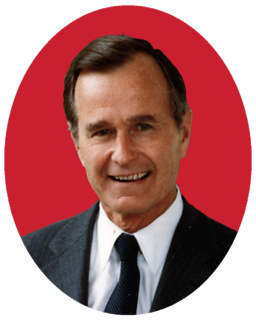
The 1988 Republican National Convention of the Republican Party of the United States was held in the Louisiana Superdome in New Orleans, Louisiana from August 15 to August 18, 1988. It was the second time that a major party held its convention in one of the five states known as the Deep South, coming on the heels of the 1988 Democratic National Convention, which was held in Atlanta, Georgia. Much of the impetus for holding the convention in the Superdome came from the Louisiana Republican National Committeewoman Virginia Martinez of New Orleans, who lobbied on behalf of her adopted home city as the convention site as a member of the RNC Executive Committee.
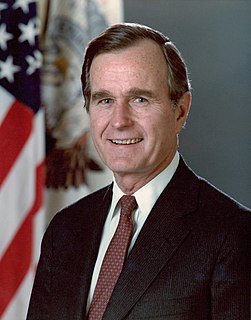
The 1988 Republican presidential primaries were the selection process that Republican voters used to choose their nominee for President of the United States in the 1988 U.S. presidential election. Incumbent Vice President George H.W. Bush was selected as the nominee through a series of primary elections and caucuses culminating in the 1988 Republican National Convention held from August 15 to August 18, 1988, in New Orleans, Louisiana.

The 1990 United States Senate special election in Indiana was a special election held on November 6, 1990, in order to fill the Class III seat in the United States Senate from Indiana for the remainder of the term ending January 3, 1993. Incumbent Republican U.S. Senator Dan Coats, who was recently appointed to this seat two years prior, won election to serve out the remainder of the term.

The 1988 United States presidential election in Alabama took place on November 8, 1988. All fifty states and the District of Columbia, were part of the 1988 United States presidential election. Alabama voters chose nine electors to the Electoral College, which selected the president and vice president.

The 1988 United States presidential election in Alaska took place on November 8, 1988. All 50 states and the District of Columbia, were part of the 1988 United States presidential election. Alaska voters chose 3 electors to the Electoral College, which selected the president and vice president.

The 1988 United States presidential election in Delaware took place on November 8, 1988. All 50 states and the District of Columbia, were part of the 1988 United States presidential election. Delaware voters chose 3 electors to the Electoral College, which selected the president and vice president.

The 1988 United States presidential election in Kansas took place on November 8, 1988. All fifty states and the District of Columbia, were part of the 1988 United States presidential election. Kansas voters chose seven electors to the Electoral College, which selected the president and vice president.

The 1988 United States presidential election in Ohio took place on November 8, 1988. All fifty states and the District of Columbia, were part of the 1988 United States presidential election. Ohio voters chose twenty-three electors to the Electoral College, which selected the president and vice president.

The 1988 United States presidential election in South Dakota took place on November 8, 1988. All 50 states and the District of Columbia, were part of the 1988 United States presidential election. South Dakota voters chose 3 electors to the Electoral College, which selected the president and vice president.

The 1988 United States presidential election in Tennessee took place on November 8, 1988. All 50 states and the District of Columbia were part of the 1988 United States presidential election. Tennessee voters chose 11 electors to the Electoral College, which selected the president and vice president.

The 1988 United States presidential election in Utah took place on November 8, 1988. All fifty states and the District of Columbia, were part of the 1988 United States presidential election. Utah voters chose five electors to the Electoral College, which selected the president and vice president.
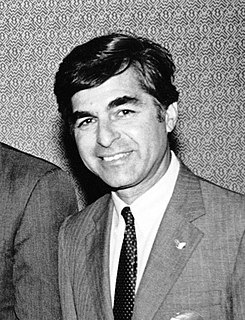
The 1988 United States presidential election in West Virginia took place on November 8, 1988. All 50 states and the District of Columbia were part of the 1988 United States presidential election. West Virginia voters chose 6 electors to the Electoral College, which selected the president and vice president.

This article lists those who were potential candidates for the Democratic nomination for Vice President of the United States in the 1988 election. Massachusetts Governor Michael Dukakis won the 1988 Democratic nomination for President of the United States, and chose Texas Senator Lloyd Bentsen as his running mate. Dukakis chose Bentsen in order to appeal to Southerners and in hopes of carrying Bentsen's home state of Texas. The choice of Bentsen caused some backlash from Jesse Jackson, who had wanted to be chosen as the vice presidential nominee, and progressives such as Ralph Nader. Paul Brountas, a longtime Dukakis aide, led the search for Dukakis's running mate. The Dukakis-Bentsen ticket would lose to the Bush-Quayle ticket in the general election. Coincidental to the presidential election, Bentsen won re-election as senator.

This article lists those who were potential candidates for the Republican nomination for Vice President of the United States in the 1996 election. Former Kansas Senator Bob Dole won the 1996 Republican nomination for President of the United States, and chose former New York Representative Jack Kemp as his running mate. Dole chose Kemp as his running mate in order to solidify support among the conservative wing of the Republican Party, despite the mutual personal distaste the two candidates had for each other. The Dole-Kemp ticket would lose the 1996 election to the Clinton-Gore ticket.
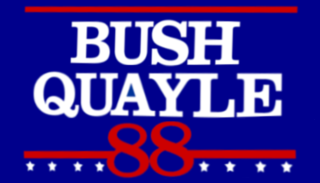
The 1988 presidential campaign of George H. W. Bush began on October 13, 1987, when Bush, then the sitting Vice President of the United States, announced he was running for the Republican Party's nomination in the 1988 U.S. presidential election. Bush won the 1988 election against Democratic nominee Michael Dukakis on November 8, 1988. He was subsequently inaugurated as president on January 20, 1989.




